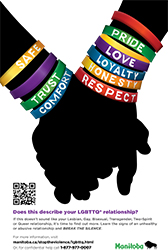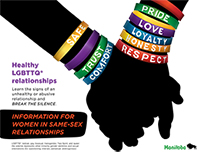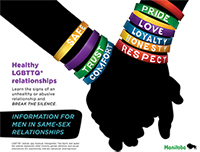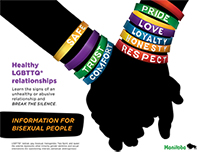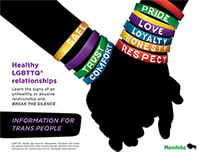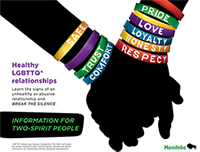 |
Stop the Violence

Healthy Relationships for LGBTTQ* People
Everyone deserves to be in a healthy relationship free from violence and abuse.
LGBTTQ*: lesbian, gay, bisexual, transgender, Two-Spirit and queer. The asterisk represents other minority gender identities and sexual orientations (ex: questioning, intersex, pansexual, androgynous)
Homophobia/biphobia/transphobia: a term used to describe hatred, fear or discrimination toward, or negative beliefs about gay and lesbian people (homophobia), bisexual people (biphobia), transgender people (transphobia) and others perceived to be these sexual orientations or gender identities.
Heterosexism: the belief that everyone is, or should be heterosexual. Heterosexism includes assuming that others are heterosexual, and that heterosexuality is superior to other sexual orientations.
What is a Healthy Relationship?
In healthy relationships, both partners feel respected, valued and loved for who they are. Communication is open, honest and calm, even when partners disagree.
It is also important for partners to maintain relationships with friends and family they care about, and to maintain interests outside of the relationship.
Healthy LGBTTQ* Relationships Poster |
To learn more about healthy, unhealthy and abusive relationships, see the following fact sheets:
Information for Lesbians |
Information for Gay Men |
Information for Bisexual People |
||
Information for Trans People |
Information for Two-Spirit People |
|||
Examples of Abuse
Physical: harming, or threatening to harm a partner, someone they care about, or animals they care about; destroying their belongings; threatening to infect a partner with HIV
Sexual: forcing or coercing a partner into a sexual act; sexual contact that demeans or humiliates the partner; shaming a partner about their body, sexual performance or sexuality
Emotional/Verbal: demeaning or intimidating a partner; yelling at a partner; isolating a partner from friends and family; controlling where a partner goes; stalking and harassing; using insults and name-calling; threatening to take children away or turn them against a partner; threatening to harm oneself or commit suicide to control a partner
Financial: controlling the finances; using a partner's money without their consent; interfering with a partner's employment or education so they won't be able to have an income
Identity Abuse (this can overlap with emotional abuse): using aspects of a partner's identity to demean and control them, including using their sex, sexual or gender identity, age, culture, race, appearance, class, spirituality, ability, health status, or immigration status; includes threats to out a partner, turn their community against them (ex: LGBTTQ* community, spiritual or cultural community), disclose medical conditions (ex: HIV status) and threats to have them deported
Challenges and Myths
Relationship abuse isn't easy to talk about. There are added challenges for LGBTTQ* people, due to homophobia, transphobia, and heterosexism. Like relationship abuse, these kinds of discrimination can lead to feelings of shame and worthlessness.
Some LGBTTQ* people come to believe that because of their sexual orientation or gender identity, they deserve to be abused and will never be able to find a loving, healthy relationship. These feelings can be compounded for LGBTTQ* people who have also experienced other forms of discrimination, such as racism, sexism, or discrimination due to having a disability or medical condition.
There are many myths about LGBTTQ* relationship abuse. These myths can make it more difficult for LGBTTQ* people to recognize an abusive relationship and seek help. Even once the abuse is acknowledged, LGBTTQ* people may fear a homophobic/transphobic response from those who could help them.
- Myth: Domestic violence only happens in straight relationships, or only among certain groups within LGBTTQ* communities.
Reality: Domestic violence happens among LGBTTQ* people of all ages, cultures, income levels, spiritualities, professions, abilities and regions of the province. According to Statistics Canada, in 2009, 20 per cent of gay, lesbian and bisexual people reported experiencing violence by a legally married or common-law partner (current or former) within the past five years (note: respondents were not asked whether the abuse was by a same-sex or opposite sex partner). - Myth: Abuse in LBGTTQ* relationships is mutual, with both partners contributing equally to the violence.
Reality: In abusive relationships, one person is often directing more of the abusive behaviours toward the other. In same-sex relationships, just because partners are the same gender does not mean that they are equally to blame for the violence. - Myth: The bigger, stronger, more butch partner is always the aggressor in abusive relationships. The victim is always femme, smaller and weaker. If the stronger partner is being abused, they should be able to fight back.
Reality: Size, strength, and gender expression (ex: masculinity, femininity) do not determine which partner is being abusive and which is being victimized. People who have been verbally and emotionally abused often feel beaten down and cannot fight back against physical abuse -- even if they are bigger and stronger than their partner.
Help is available
Contact one of the resources below for more information and find out how to create your own protection plan. If you are in an abusive relationship, or you know someone who may be, call the province-wide, 24-hour domestic violence information/crisis line at: 1-877-977-0007, to be routed to the nearest family violence shelter.
If you are in immediate danger, call 911
Click here for information on creating a protection plan
Click here for a list of resources and supports in Manitoba
Rainbow Resource Center: 204-474-0212 in Winnipeg
Acknowledgements:
Thank you to the Rainbow Resource Centre, Two-Spirited People of Manitoba, Aurora House and other community members who contributed to the development of the LGBTTQ* relationship abuse awareness materials. As well, thank you to the Alberta government for sharing their publication Abuse in Same-Sex and LGBTQ* Relationships.

